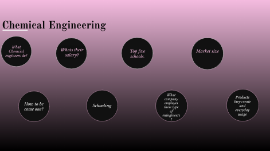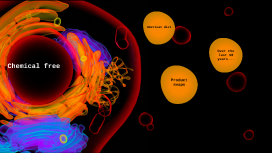Chemical Engineering PowerPoint
Transcript: Chemical Engineering What Chemcial engineers do? Chemical engineers develop and design chemical manufacturing processes. Chemical engineers apply the principles of chemistry, biology, physics, and mathematics to solve problems that involve the production or use of chemicals, fuel, drugs, food, and many other products. What Chemcial engineers do? More info on what they do What do chemical engineers do? Within these industries, chemical engineers rely on their knowledge of mathematics and science—particularly chemistry— to overcome technical problems safely and economically. And, of course, they draw upon and apply their engineering knowledge to solve any technical challenges they encounter. Specifically, chemical engineers improve food processing techniques, and methods of producing fertilizers, to increase the quantity and quality of available food. They also construct the synthetic fibers that make our clothes more comfortable and water resistant; they develop methods to mass-produce drugs, making them more affordable; and they create safer, more efficient methods of refining petroleum products, making energy and chemical sources more productive and cost effective. Chemical engineers also develop solutions to environmental problems, such as pollution control and remediation. They process chemicals, which are used to make or improve just about everything you see around you. Pictures How to be come one? Step 1: Research Career Duties and Education Step 2: Earn a Bachelor's Degree in Chemical Engineering Step 3: Complete an Internship or Cooperative Education Experience Step 4: Join a Professional Organization Step 5: Consider Earning a Master's Degree in Chemical Engineering How to become a chemical engineer Specific Major Requirements-Any student in the chemical and biomolecular engineering program whose grade point average in required chemical and biomolecular engineering courses is less than 2.4 will be admitted to the required courses of the following year only with the special permission of the department. Total Credit Hours Required 131-132. As noted, chemical engineering jobs require a minimum of a bachelor's degree. Non-engineering requirements include extensive chemistry courses and labs, such as analytical, organic and physical chemistry. Other non-engineering requirements include sequences in calculus and physics. The engineering portion includes coursework and labs in chemical processes, transport, and reactions. Students might prefer programs accredited by ABET, Inc., which has accredited more than 100 chemical engineering programs. Accreditation by ABET demonstrates the school adheres to a set of academic principles and teaches its students a core set of industry-required skills. Accreditation is required by many graduate schools and licensing boards. Schooling Schooling Degree Overviews Bachelor's Degree: A baccalaureate degree in chemical engineering can prepare you for a career in the field. The degree focuses on understanding the properties of substances and methods of synthesizing those substances for medical, electronic, mechanical, and other commercial purposes. Despite its name, a chemical engineering education includes not just chemistry, but also biology, physics, and mathematics. The fundamentals of a chemical engineering degree are covered in core courses on chemical kinetics, thermodynamics, and transport processes. After those courses, students can specialize their studies in a specific area of chemical engineering. Master's Degree: A master's degree in chemical engineering is designed either for chemical engineers who want to do more advanced work or for students interested in a career as a chemical engineer, but who hold a bachelor's degree in a different field. Like the bachelor's degree, a master's program covers the core areas of thermodynamics, kinetics, and transport processes. A master's degree program will typically include research or field study in areas such as energy, biotechnology, or product development. Ph.D.: A Ph.D. program, the most advanced option for study in chemical engineering, requires you to have taken the core courses of bachelor's and master's programs. Curricula typically includes further study in general engineering and more focused chemical engineering courses. Most programs require original research and written and oral exams. Further coursework in chemical engineering for a Ph.D. may cover numerical methods in chemical engineering, chemical engineering thermodynamics, analysis of transport phenomena, and chemical reactor engineering. Degrees Degrees Average Chemical Engineer Hourly Wage in the United States Chemical Engineers earn a median hourly wage of $46.81. Hourly wages typically start from $28.59 and go up to $75.56. Average Chemical Engineer Yearly Salary in the United States Chemical Engineers earn a median salary of $97,360 per year. Salaries typically start from $59,470 and go up to $157,160. Salary Whats their salary? 1.Massachusetts

















